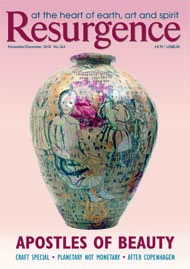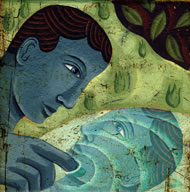Earlier this year US environmental writer Bill McKibben published a book whose odd title belied the significance of its content. McKibben is a prominent voice in the US green movement and has been associated for a long time with mainstream environmental campaigns. His latest, the 350.org campaign, is a global effort to stop climate change.
This makes Eaarth (reviewed in Resurgence 262) a very curious book, for its premise is that trying to stop climate change is futile. McKibben believes that, even if some miracle were to occur tomorrow and the world were to begin rapidly decarbonising, what we have already done to the climate, and to many of the planet’s other ecological systems, is irreversible. So much so that we are now living on what is effectively a new planet. The 10,000-year period of stability we have experienced since the last ice age ended is over. And it’s too late to go back.
McKibben has thus become the first prominent writer in the environmental mainstream to come out and say what many of us suspect: that the writing is on the wall for modern civilisation. He represents a crack in the dam, but he will not be the last. Environmentalists everywhere are having to come to terms, month by month, with a stark reality: we’re losing.
As a green writer and campaigner of 15 years’ standing, I was forced to finally admit this to myself about two years ago. I looked at the rampant and expanding growth economy, the stagnancy of our political systems, the lack of will amongst politicians. I looked at the growing human population and its ever-increasing consumer demands. I looked at the peaking of our oil supplies, and at the number of people who denied the existence of climate change.
I saw the forests continue to fall. I saw the oceans continue to empty of life, the climate continue to change and the corals continue to die. I saw the human machine continue to advance, and I saw most humans in the rich world (and a growing number elsewhere) unwilling to do much about it if it meant giving up their car, their dishwasher and their other everyday comforts. I saw a terrible bind.
I knew how, as a ‘good greenie’, I was supposed to react to this. I was supposed to tell myself that it was not too late: that though time was short, we still had ‘a window of opportunity’ in which to somehow goad the entire world to ‘act’. I was supposed to rally the troops and suppress the doubts. But I couldn’t do it any more. I didn’t believe it.
All of this forced me to confront my own prejudices about the world, my activism and my writing. And it forced me to ask myself a series of questions: how can our industrial civilisation survive the vast pressures we are placing on it? How can Nature survive it? What happens if these trends continue, as they surely will for some time to come? We have been talking for years, decades, about the importance of stopping this speeding train before it hits the wall. It looks, now, like we are too close to that wall to stop, even if we were to slam on the brakes. What does that mean? Can we survive the impact?
I didn’t know the answers to these questions, but I thought it was about time I broke ranks and at least started to ask them out loud.
Out of this crisis of confidence – or this revelation, depending on how you want to see it – came a small, self-published pamphlet entitled Uncivilisation: The Dark Mountain Manifesto. Uncivilisation was an analysis of where we are, where we’re going wrong, why none of our conventional means of trying to ‘save the world’ are working, and where this leaves us. It was also a call to action – but not of the kind I was perhaps used to. Uncivilisation was a call, not for more marches or petitions, but for writing and art. Specifically, it was a call for writers, artists and workers with the imagination to face up honestly to the position we now find ourselves in – as a civilisation and as a species.
We are facing an unprecedented planetary shift: a vast web of cultural, economic and ecological crises, which will take centuries to fully play out, but which have already begun to make themselves clear in our lifetimes. We have failed to make the changes needed to prevent this shift, so now we are going to have to deal with the consequences. Yet throughout all of this, the mainstreams of our culture flow on as before. TV, radio, theatre, fiction, poetry, music…most of it continues as if nothing had changed. Why? And what can we do about it?
These were some of the questions that Uncivilisation posed. It was quite unlike anything I’d ever written before, so I was fortunate in that I had an accomplice: Dougald Hine, who, like me, was a recovering journalist (we had connected through each other’s writing). Together we decided to publish our thoughts and see if anyone but us thought they made any sense. Uncivilisation was to be the launch of a movement of writers who we hoped would coalesce around these questions and start work on answering them. We called it the Dark Mountain Project, named for a line in a poem by the American poet Robinson Jeffers, whose prophetic verse warned of humanity’s likely trajectory nearly a century ago, when hardly anybody wanted to listen.
When we launched our little pamphlet, we were genuinely surprised to find that a lot of people did want to listen. We sold hundreds of copies, and our accompanying website had many thousands of hits. Uncivilisation was reviewed in publications as well-respected and diverse as New Statesman and The Australian Financial Review. And we received emails – hundreds of them – from a great diversity of people all over the world, who between them said pretty much exactly the same thing: “Thank you for putting into words what I have been thinking for a long time. Where do we start?”
The Dark Mountain Project was originally conceived as a fairly modest gathering of writers, working together to attune their art to radically changed and changing times. But it quickly became clear that many of the people who wanted to get involved had other skills. They were artists, musicians, farmers, scientists, woodworkers and engineers. And so Dark Mountain became a wider cultural movement of people who had stopped believing in the conventional narratives about the future, and who wanted to start unweaving some of the myths that underpin our civilisation and are leading us and the Earth to destruction: myths of human centrality; of our separation from something called ‘Nature’; of endless progress; of our ability to control the Earth. We wanted to create a movement of people who exposed these myths for what they are, and who wanted to start creating new stories more appropriate to our real place in the world.
So far, that quest has led the Dark Mountain Project to produce a book of Uncivilised writing and art, and to stage a summer festival that was attended by 400 people, as well as a growing number of smaller gatherings. We have another book planned, and more ideas in the pipeline. Most excitingly, though, in just over a year we have gone from being two men writing a self-published pamphlet to the progenitors of a genuine movement, with outposts in several countries, which is starting to take a shape independently of us.
It’s been quite a journey. Sometimes I ask myself why, and how, the Dark Mountain Project has taken off. The answer I always reach is that we have touched a nerve: given voice to a collective need for something beyond both traditional green pieties and business-as-usual glibness. Perhaps the best summary of what we have inadvertently managed to do can be found in, of all places, a line in Chuck Palahniuk’s classic novel Fight Club: “It was on the tip of everyone’s tongue. We just gave it a name.”
To read more on the Dark Mountain Project, including extracts from the Manifesto, www.resurgence.org








